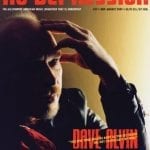Blanche – Learn By Doing
As ringleader of the early-’90s cowpunk sideshow Goober & the Peas, Dan Miller sang, shucked, jived and tossed hay around the stage. One thing he did not do was play guitar. Even so, when the band that would become Blanche first formed in Miller’s Detroit living room four years ago — with Miller himself as frontman, singer, six-string picker and sole songwriter — he was the group’s grizzled veteran.
There was Tracee Miller, who wound up playing bass — and later singing — pretty much because she’d married Dan and he needed a bass player and harmony vocalist. And there was drummer Lisa Jannon, who, like Tracee, “had never played an instrument before,” Dan admits. “But she was over one night when we were practicing songs, so we said, ‘Here, take this snare drum.’ Dave Feeny, the pedal steel player, had been in bands playing guitar, but he’d never touched the steel. And our banjo player, Patch Boyle, he’d never played an instrument either, so he had no idea what he was doing.”
Consider this, and you start to understand why Blanche waited four years to release an album. “We never really felt that confident,” Dan says.
They needed, naturally, to practice — but that was something the men and women of Blanche weren’t too keen on. Instead, they followed the example of their hometown’s rock-first, ask-questions-later garage scene and simply learned by doing. “We just decided to practice onstage,” Dan recalls with a laugh. “One thing that helped us was the honesty of our friends — like, ‘God, that was horrible!'”
Certainly, Blanche has never lacked for friends. In fact, you might say that while their sound is Sixteen Horsepower, their pedigree is Six Degrees Of Separation. Maybe best-known is the band’s Jack White connection: He briefly played drums with Goober & the Peas and later formed Two-Star Tabernacle with Dan, Tracee and drummer Damian Lang. Two-Star recorded a Bloodshot 7-inch with Andre Williams before splitting, which they did in part because a newer project, the White Stripes, seemed to be going well for Jack.
The famous associations don’t end there. Last year, White invited Blanche’s Feeny to play steel on the Van Lear Rose sessions Jack produced for Loretta Lynn. (There, Feeny played with multi-instrumentalist Jack Lawrence, who has since joined Blanche in place of Boyle.) And this summer, Dan will portray guitarist Luther Perkins in a Hollywood biopic that stars Joaquin Phoenix as Johnny Cash and Reese Witherspoon as June Carter.
But back to Blanche, who spent their early days playing whatever gigs they could get and frequently falling on their faces. “It [was] a struggle for me, but it’s been really inspiring,” Tracee Miller says. “I think it’s good to be a little uncomfortable, because it makes you strive to find your own talent.”
By the time the band felt sure they had chops enough to record, real life stepped in. “My brother died,” Dan says of Mike Miller, also a former member of Goober & the Peas who suffered from schizophrenia and bipolar disorder. “And in the same year, Tracee’s dad died. It was like when you read in the paper about all these things happening to one person, diseases or acts of god or murder and drunk driving. How do you make sense of the world?”
For the Millers, it was only natural to look for answers through music — which explains why Blanche’s debut disc, If We Can’t Trust The Doctors, seems so intrigued by matters of fate, faith, mortality, and the vagaries of brutal luck. “People say, ‘These songs are so depressing. How did you make all these emotions up?'” Dan says. “We’re like, ‘Well, it’s all stuff that happened to us.’ At the same time, we wanted to not have it come off as a really bleak album, [but] make it something that’s more comforting than depressing.”
That’s a recipe Blanche’s friends Brett & Rennie Sparks of the Handsome Family have perfected, and the Millers are quick to credit them. “They’ve been a huge inspiration,” Dan says. “I think they really did create their own sound.” Likewise, he and Tracee don’t talk long without citing the impact of Hank Williams, the Carter Family, Lee Hazlewood and the Gun Club on Blanche’s stately, slightly foreboding sound.
Maybe most interesting among the band’s professed role models, however, is something not so tangible: The history of their own hometown. “There’s a long tradition of country music here in Detroit,” Dan explains. “There are so many people who moved up here to work on the auto lines, and they’re still here. All these senior citizens get together for potluck Monday night jams at the senior homes, and they’re just the most beautiful people. They get together and still feel a kinship with their homes, with their roots, by singing songs.”
That sort of sincerity could hardly be further removed from the grating goofiness of Miller’s Goober days, when he hammed through the likes of “Hunt For Grandpa” and “Hot Women (Cold Beer)”. “We tried to have fun with it, but after a while it just wasn’t inspiring anymore,” Dan says. “That’s one of the reasons we ended the band, and that’s one of the things we decided with Blanche: We didn’t want [an image] to overpower the music.”




